

Antibody Tests Won’t Get Us Back to Normal. “I think there was a lot of hope that we would do the antibody testing or do the serosurveys and then we would see there was a huge amount of immunity built up in the population,” Natalie Dean, a biostatistician at the University of Florida, told me.
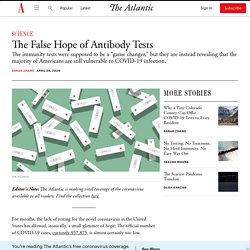
But earlier data from outside the U.S. have suggested otherwise. One study in the hard-hit municipality of Gangelt, considered “Germany’s Wuhan,” found 14 percent of people testing positive for antibodies. “It was clear from that point, for me, that we weren’t going to see big numbers,” Dean said. The idea of reopening the country based on antibody tests runs into the technical limits of the tests themselves. Scientists don’t know exactly how long immunity to COVID-19 will last and what level of antibodies confers immunity. Meanwhile, a flood of new test kits with varying rates of accuracy is now hitting the market. Read: The U.K.’s coronavirus ‘herd immunity’ debacle. Should You Get an Antibody Test?
Read: The best hopes for a coronavirus drug This is false hope, going beyond what science can yet say.

The basics of immunity—mechanisms most of us haven’t thought about since high-school biology, if ever—have suddenly been politicized to the point that they seem much more confusing than they actually are. So I thought a basic FAQ might be of use. What is serology? The study of serum. What does it mean if I have antibodies? If you have antibodies to any virus, it means you’ve been exposed to that virus (or a vaccine for it).
Do antibodies kill the virus? Antibodies are proteins that float around in your blood and, essentially, look for things that are not right. Read: The people who risked death for immunity Will everyone develop antibodies? Most humans have antibodies to the four coronaviruses that cause common colds, and it’s expected that antibodies to the new coronavirus will reliably develop in most people who are exposed to it. How Many Americans Have Been Tested for the Coronavirus? Ezekiel J.
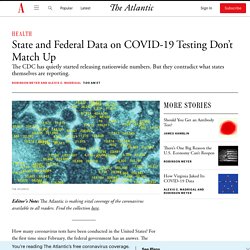
Emanuel and Paul M. Romer: Without more tests, America can’t reopen With the new CDC site, the federal government is providing regular testing data again, and for the first time ever, it is doing so on a state-by-state level. But an initial analysis of the CDC’s state-level data finds major discrepancies between what many states are reporting and what the federal government is reporting about them. In Florida, for example, the disparity is enormous. “If this is what they’re getting, the CDC should pick up the phone and call the state of Florida and say, ‘What’s happening?’” Given the complexity and the multisource nature of the data, some variations should certainly be anticipated. Read: The four key reasons the U.S. is so behind on coronavirus testing In New Hampshire, the CDC reports about half as many tests as the state government; in Indiana, it reports about half as many more. Testing-Overview-Final. U.S. Lags in Coronavirus Testing After Slow Response to Outbreak.
Coronavirus testing data has been spotty and not easily available, especially in the United States.
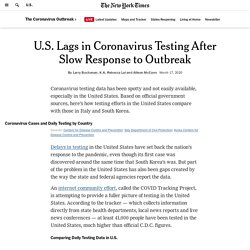
Based on official government sources, here’s how testing efforts in the United States compare with those in Italy and South Korea. Coronavirus Cases and Daily Testing by Country Delays in testing in the United States have set back the nation’s response to the pandemic, even though its first case was discovered around the same time that South Korea’s was. But part of the problem in the United States has also been gaps created by the way the state and federal agencies report the data. An internet community effort, called the COVID Tracking Project, is attempting to provide a fuller picture of testing in the United States. Comparing Daily Testing Data in U.S. Mesa Biotech receives COVID-19 FDA Emergency Use Authorization — Mesa Biotech.
Easy to use, palm-sized system will enable broader use across healthcare facilities closer to the patients and will begin shipping immediately SAN DIEGO, CA – March 24, 2020 – Today, Mesa Biotech announced it has received Emergency Use Authorization (EUA) from the U.S.
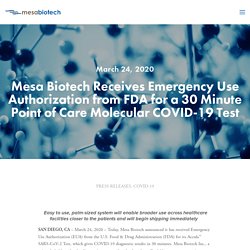
Food & Drug Administration (FDA) for its Accula™ SARS-CoV-2 Test, which gives COVID-19 diagnostic results in 30 minutes. Mesa Biotech Inc., a privately-held, molecular diagnostic company has developed an affordable, easy to use, testing platform designed for point-of-care (POC) infectious disease diagnosis. The COVID-19 test uses this patented technology to enable ‘near patient’ testing allowing testing outside of the central laboratory. “Mesa is excited to immediately begin shipping our rapid, molecular SARS-CoV-2 test so people can get answers in 30 minutes. About Mesa Biotech Inc. Cepheid Receives Emergency Use Authorization from FDA for Rapid SARS-CoV-2 Test - Mar 21, 2020.
First Rapid, Point-of-Care and Near-Patient Molecular Test for Detection of Virus that Causes COVID-19 SUNNYVALE, Calif., March 21, 2020 /PRNewswire/ -- Cepheid today announced it has received Emergency Use Authorization (EUA) from the U.S.

Food & Drug Administration (FDA) for Xpert® Xpress SARS-CoV-2, a rapid molecular diagnostic test for qualitative detection of SARS-CoV-2, the virus causing COVID-19. The test has been designed to operate on any of Cepheid's more than 23,000 automated GeneXpert® Systems worldwide, with a detection time of approximately 45 minutes. "During this time of increased demand for hospital services, Clinicians urgently need an on-demand diagnostic test for real-time management of patients being evaluated for admission to health-care facilities. "Cepheid currently has nearly 5,000 GeneXpert® Systems in the US capable of point-of-care testing and for use in hospitals," said Cepheid President Warren Kocmond. The test will begin shipping next week. About Cepheid. Coronavirus (COVID-19) Update: FDA Informs Public About Possible Accuracy Concerns with Abbott ID NOW Point-of-Care Test.
For Immediate Release: May 14, 2020 Today, the U.S.
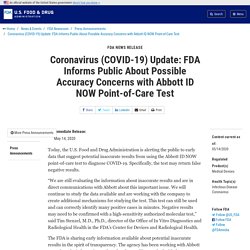
Food and Drug Administration is alerting the public to early data that suggest potential inaccurate results from using the Abbott ID NOW point-of-care test to diagnose COVID-19. Specifically, the test may return false negative results. “We are still evaluating the information about inaccurate results and are in direct communications with Abbott about this important issue. Johns Hopkins COVID-19 Testing Insights Initiative - Johns Hopkins Coronavirus Resource Center. Global Progress on COVID-19 Serology-Based Testing. Serology testing for SARS-CoV-2 is at increased demand in order to better quantify the number of cases of COVID-19, including those that may be asymptomatic or have recovered.
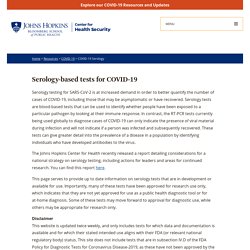
Serology tests are blood-based tests that can be used to identify whether people have been exposed to a particular pathogen by looking at their immune response. In contrast, the RT-PCR tests currently being used globally to diagnose cases of COVID-19 can only indicate the presence of viral material during infection and will not indicate if a person was infected and subsequently recovered. These tests can give greater detail into the prevalence of a disease in a population by identifying individuals who have developed antibodies to the virus.
The Johns Hopkins Center for Health recently released a report detailing considerations for a national strategy on serology testing, including actions for leaders and areas for continued research. You can find this report here. This page was last updated on May 15, 2020. Statistical Guidance on Reporting Results from Studies Evaluating Diagnostic Tests - Guidance for Industry and FDA Staff. Docket Number: Issued by: Guidance Issuing Office Center for Devices and Radiological Health PDF Printer Version (337 KB) Document issued on: March 13, 2007 The draft of this document was issued on March 12, 2003.
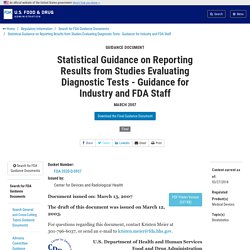
For questions regarding this document, contact Kristen Meier at 301-796-6037, or send an e-mail to kristen.meier@fda.hhs.gov. Viral-Transport-Medium. SARS-CoV-2. COVID-19 Crux. COVID-19 Crossroads. Epidēmia.
Reëntry Débâcles. Back.Track. PANDEMOCRACY. COVID-19.